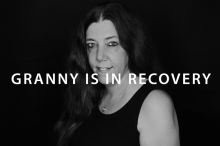Simon’s first Narcotics Anonymous (NA) meeting was pivotal, not just in helping him turn his life around, but also in setting him up to make future significant contributions to NA both in the UK and abroad. (8,853 words)
Michael’s 44th Sober Anniversary, and an Update
 My good friend Michael (Mike) Scott from Perth, Western Australia, last had a drink 44 years (16,060 days) ago today. This morning, I’m going to celebrate his achievement with a blog post.
My good friend Michael (Mike) Scott from Perth, Western Australia, last had a drink 44 years (16,060 days) ago today. This morning, I’m going to celebrate his achievement with a blog post.
Mike first contacted me about our Daily Dose website back in 2002 when I lived in Wales. He loved our drug and alcohol news portal that I had launched with Ash Whitney early in 2001. I gave Mike a big shock when I called him one day back in 2009 and suggested that we have lunch together. He replied, ‘How can we do that? You live on the opposite side of the world.’ I told him that I had moved to Perth on Christmas Day 2008.
Since then, we have become best mates. We generally meet once a week for lunch and go out with Mike’s wife Andrea and my partner Linda every few weeks. The four of us have just come back from a week’s holiday in magical Broome in the north-west of Australia. There, we celebrated Mike and Andrea’s 30th wedding anniversary.
Kevan Martin’s Birthday and Story Update
 Birthday greetings to my good friend Kevan Martin. I celebrated Kevan’s 60th Birthday last year with a blog post; it was the same day that I launched my eBook Our Recovery Stories: Journeys from Drug and Alcohol Addiction. Kevan’s Story, He’s a Loser and Will Never Be Any Good, is one of 15 stories in the book. The major part of the Story also appears on this website. It’s an impressive and moving story about the overcoming of adversity… and a commitment to helping other people overcome addiction.
Birthday greetings to my good friend Kevan Martin. I celebrated Kevan’s 60th Birthday last year with a blog post; it was the same day that I launched my eBook Our Recovery Stories: Journeys from Drug and Alcohol Addiction. Kevan’s Story, He’s a Loser and Will Never Be Any Good, is one of 15 stories in the book. The major part of the Story also appears on this website. It’s an impressive and moving story about the overcoming of adversity… and a commitment to helping other people overcome addiction.
Kevan is one of the most remarkable people I have ever met. After 25 years of problem drinking and eight years in and out of psychiatric hospitals, Kevan set up and ran NERAF (Northern Engagement into Recovery from Addiction) which eventually had nearly 100 staff and volunteers and provided a support service across the north-east of England. It all began in the following way:
‘So, I started a support group for people with alcohol problems in my own home. I often used to meet people that I had been in treatment with out and about, and eventually I started to say, ‘Come down to my place Tuesday night.’ Within a month, I had six people attending. Word of mouth ensured that my home was soon packed with people I had met throughout my years of spinning through the revolving door of treatment.’
Learning About Me: Paul
 In a previous series of blogs starting here, I have emphasised that the effects of a psychoactive drug are not just dependent on its biochemical actions in the brain. They are related to the drug, set (person) and setting (social context). The problems that arise from drug-taking, such as addiction and dependence, are not just related to the drug—it’s drug, set and setting. And the same is true of recovery.
In a previous series of blogs starting here, I have emphasised that the effects of a psychoactive drug are not just dependent on its biochemical actions in the brain. They are related to the drug, set (person) and setting (social context). The problems that arise from drug-taking, such as addiction and dependence, are not just related to the drug—it’s drug, set and setting. And the same is true of recovery.
In an earlier blog, I revealed how Brad had been told by a colleague that his drinking problem was not just due to alcohol. It was about him. In this blog, I’ll use the words of Paul to describe how he learnt the same truth in relation to his drug problem, a drug problem that was a ‘little’ different to what most people experience.
A Life-Changing Time
 In an earlier series of blogs starting here, I described what I initially learnt about addiction treatment at a local treatment agency in Swansea, West Glamorgan Council on Alcohol and Drug Abuse (WGCADA) in the early 2000s. Later, in 2005, I was commissioned to write a profile of the agency, which ended up being over 180 pages long and containing a number of Stories. Here’s is one such Story, of someone recovering from a serious alcohol problem:
In an earlier series of blogs starting here, I described what I initially learnt about addiction treatment at a local treatment agency in Swansea, West Glamorgan Council on Alcohol and Drug Abuse (WGCADA) in the early 2000s. Later, in 2005, I was commissioned to write a profile of the agency, which ended up being over 180 pages long and containing a number of Stories. Here’s is one such Story, of someone recovering from a serious alcohol problem:
‘I am writing about an amazing two years in my life. It has truly been a life-changing time. Not only have I stopped drinking (and that in itself I would never have believed possible!), but I’ve really begun to live life more fully and have been able to put my life back together again in a very positive way. Throughout this time, I have had great support and help from WGCADA. I can’t speak highly enough about the organisation and the staff I have been in contact with…. so please read on…
‘Brad, You Haven’t Just Got a Problem with Alcohol.’
 ‘The most important thing that therapists can do to be helpful is to find ways of supporting, stimulating, and energizing client’s investment and involvement. The second most important thing is to stimulate and support powerful client learning and meaning-making processes.’ How Clients Make Therapy Work: The Process of Active Self-Healing by Arthur C Bohart and Karen Tallman.
‘The most important thing that therapists can do to be helpful is to find ways of supporting, stimulating, and energizing client’s investment and involvement. The second most important thing is to stimulate and support powerful client learning and meaning-making processes.’ How Clients Make Therapy Work: The Process of Active Self-Healing by Arthur C Bohart and Karen Tallman.
I’d like to introduce to another our Storytellers, Brad Miah-Phillips. In many ways, Brad’s life couldn’t have been more different to the last Storyteller to whom I introduced you, Tim. However, they have both come back from very dark places.
I first met Brad in April 2009 when he made Mark Gilman and I breakfast at The Basement Project in Halifax, UK, or the Breakfast Club as it was known then. Mark and I were visiting Stuart Honor, the amazing man who originally set up this recovery initiative. I only met Brad in person once after that, but I came to know him well when he became a regular blogger on Wired In To Recovery. We have spent a lot of time on Skype as I have interviewed Brad about his amazing life.
Some Magical Words About Recovery: Tim
 I’d like you to ‘meet’ Tim, a medical doctor who found recovery from addiction. He is one of the Storytellers in my new book Our Recovery Stories: Journeys from Drug and Alcohol Addiction. In the seven-year update to his original Story, ‘Doctor in Recovery’, Tim wrote some magical words about recovery that I include below. But first, a brief summary of Tim’s original story, using some of his sentences.
I’d like you to ‘meet’ Tim, a medical doctor who found recovery from addiction. He is one of the Storytellers in my new book Our Recovery Stories: Journeys from Drug and Alcohol Addiction. In the seven-year update to his original Story, ‘Doctor in Recovery’, Tim wrote some magical words about recovery that I include below. But first, a brief summary of Tim’s original story, using some of his sentences.
‘Growing up in an alcoholic home is a challenge for any child and I was no different. I found school a haven from the unpredictability of my home life. I started to drink to deal with the stresses of work after medical school. Over time, my drinking became worse and worse.’
One morning, as I took the cornflakes and a bottle of whiskey off a shelf together, I thought, ‘This isn’t quite right.’ My first experience of treatment was medical-based—it had prescriptions, but lacked hope! I experienced terrible anxiety and cravings. After relapsing, I made the ‘discovery’ that opiates abolish craving for alcohol… and developed an opiate addiction as well.
‘Stigma and Service Integration’ by Bill White
 In his latest blog, Bill White emphasises the importance of Recovery Stories and their value in tackling stigma.
In his latest blog, Bill White emphasises the importance of Recovery Stories and their value in tackling stigma.
‘One of the emerging trends of U.S. health care reform is the tri-directional integration of addiction treatment, mental health services, and primary health care. This is evident in the growing integration of addiction and psychiatric treatment under the rubric of “behavioral health care,” efforts to integrate primary health care within addiction treatment settings, and increased delivery of addiction-related services within primary health care settings, e.g., physician offices, health clinics, and hospitals.
Considerable resources have been invested in creating policy frameworks for such integration (e.g., provisions for office-based treatment of opioid dependence) and developing technological innovations (e.g., screening, assessment, and treatment protocol) to facilitate such integration, but history would suggest a far greater obstacle to service integration: social and professional stigma.
I Am Not Anonymous: Jodi’s Story, ‘Granny is in Recovery’
 ‘My name is Jodi Savits and I am a grateful person in long-term recovery. For me what that means is I have not used a drug or had a drink since October 14th, 2000. The 23 years prior to that were a miserable combination of both alcohol and drugs in one form or another.
‘My name is Jodi Savits and I am a grateful person in long-term recovery. For me what that means is I have not used a drug or had a drink since October 14th, 2000. The 23 years prior to that were a miserable combination of both alcohol and drugs in one form or another.
I grew up in an upper middle class neighborhood on Long Island in New York. For all outward appearances it was a loving, supportive family. Early on I was a very intelligent girl who received good grades in school and was going to be a doctor or a lawyer. I went home from school every day and did my homework. I had very few friends. I guess I was a nerd.
At the age of 13 I found marijuana in my father’s bedroom drawer when he asked me to grab a sweatshirt for him. I took some to school and all of a sudden other kids wanted to hang out with me. The best part was the feeling- the numb. I was smiling and laughing without having to try. And so it began. As the years passed by I found and needed more and more to maintain the numb.
‘The Street to Recovery’ by Kevin Kennedy
 Remember this guy? Well, he has a Recovery Story to tell, which you can read about in his new book. Meanwhile, here is an article from Addiction Today.
Remember this guy? Well, he has a Recovery Story to tell, which you can read about in his new book. Meanwhile, here is an article from Addiction Today.
‘Kevin Kennedy – Curly Watts from TV’s long-running Coronation Street, and so popular he drew in 22million viewers for his TV wedding – has now been sober for 15 years. He shares his experience of alcoholism and rehab, strength of recovery and hope for the future with Addiction Today readers. Pdf
PROLOGUE: A FRIDAY IN AUGUST 1998
Sometime in the morning, I came round. I’d blacked out from the drink, with no memory of the night before. As soon as I opened my eyes, before I’d even focused on the room around me, I knew I had done it again. After all the promises, even swearing on the Bible and all the pleas for second chances, I’d still gone ahead and lost it. The four hideous horsemen – shame, remorse, self-disgust, and, worst of them all, fear – had found me, again.
Simon’s Moment of Clarity
 In reading Simon’s Recovery Story, it seems that he had two major Moments of Clarity. Mind you, I’m sure he had many others along his recovery journey!
In reading Simon’s Recovery Story, it seems that he had two major Moments of Clarity. Mind you, I’m sure he had many others along his recovery journey!
‘One day, I received a letter from the head of faculty, asking me to come to see him in his office. I’d stopped attending lectures and tutorials, and I was only attending university to collect giro cheques from my mailbox.
I knew that my addiction had come out on top again, and that I’d need all my wits about me if everything was not all going to fall down around me – my brittle facade of lies and last chances and denial that I would retreat into every time I was challenged.
‘Recovery Stories from the 19th Century’ by Bill White
 Here is a fascinating addition to Bill White’s website, a series of Recovery Stories from the 19th and beginning of the 20th century.
Here is a fascinating addition to Bill White’s website, a series of Recovery Stories from the 19th and beginning of the 20th century.
‘In the minds of the public and many helping professionals, the history of addiction recovery in the United States begins with the founding of Alcoholics Anonymous in the mid-1930s.
That view, of course, obscures the long history of pre-AA recovery mutual aid. That earlier history spans the eighteenth century rise of abstinence-based religious and cultural revitalization movements (recovery circles) within Native American tribes and nineteenth century groups such as the Washingtonians, recovery-focused fraternal temperance societies, the Ribbon Reform Clubs and recovery support groups associated with early addiction treatment programs (the Ollapod Club, Godwin Association, Keeley Leagues).
Steve’s Recovery Minute
Here’s Steve’s truly inspiring Recovery Story. Steve is from Birmingham in the UK. Thanks for this, Steve. And thanks to CCAR and their A Recovery Minute series on YouTube.
“… I’m just living a dream. I wouldn’t have had the audacity to believe that I’d be living the life I’m living.
I’m sitting here… I’m in Connecticut… I didn’t move out of my house unless I really had to. I’ve just gone to Philadelphia, gone to Brooklyn. I’ve come to CCAR to look at the service that they deliver, and that’s been really inspiring. I’m going back to New York and then back to Philadelphia.





